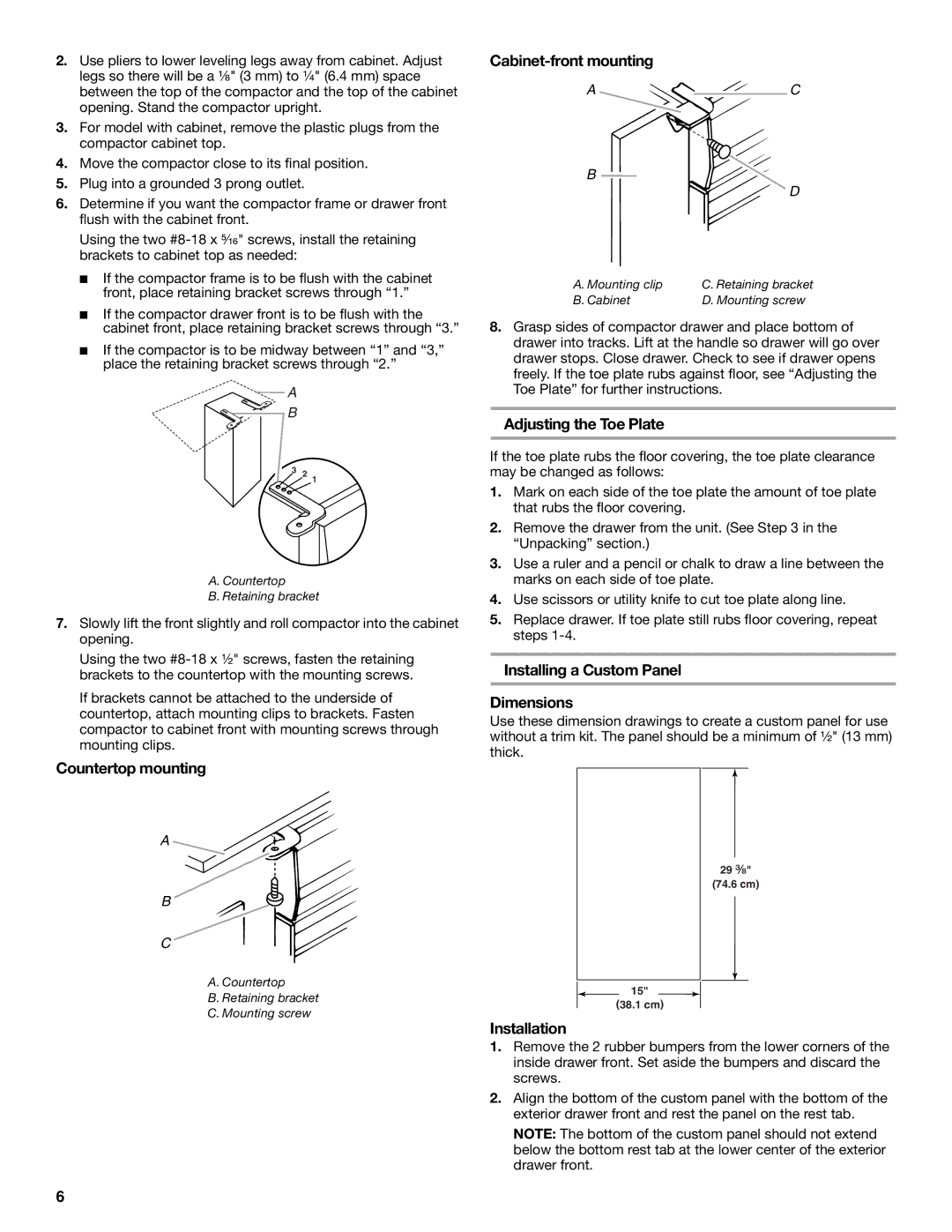
2.Use pliers to lower leveling legs away from cabinet. Adjust legs so there will be a ¹⁄₈" (3 mm) to ¹₄ " (6.4 mm) space between the top of the compactor and the top of the cabinet opening. Stand the compactor upright.
3.For model with cabinet, remove the plastic plugs from the compactor cabinet top.
4.Move the compactor close to its final position.
5.Plug into a grounded 3 prong outlet.
6.Determine if you want the compactor frame or drawer front flush with the cabinet front.
Using the two
■If the compactor frame is to be flush with the cabinet front, place retaining bracket screws through “1.”
■If the compactor drawer front is to be flush with the cabinet front, place retaining bracket screws through “3.”
■If the compactor is to be midway between “1” and “3,” place the retaining bracket screws through “2.”
A
B
3 2 1
A.Countertop
B.Retaining bracket
7.Slowly lift the front slightly and roll compactor into the cabinet opening.
Using the two
If brackets cannot be attached to the underside of countertop, attach mounting clips to brackets. Fasten compactor to cabinet front with mounting screws through mounting clips.
Countertop mounting
A ![]()
B![]()
C
A.Countertop
B.Retaining bracket
C.Mounting screw
Cabinet-front mounting
A![]() C
C
B ![]()
D
A. Mounting clip | C. Retaining bracket |
B. Cabinet | D. Mounting screw |
8.Grasp sides of compactor drawer and place bottom of drawer into tracks. Lift at the handle so drawer will go over drawer stops. Close drawer. Check to see if drawer opens freely. If the toe plate rubs against floor, see “Adjusting the Toe Plate” for further instructions.
Adjusting the Toe Plate
If the toe plate rubs the floor covering, the toe plate clearance may be changed as follows:
1.Mark on each side of the toe plate the amount of toe plate that rubs the floor covering.
2.Remove the drawer from the unit. (See Step 3 in the “Unpacking” section.)
3.Use a ruler and a pencil or chalk to draw a line between the marks on each side of toe plate.
4.Use scissors or utility knife to cut toe plate along line.
5.Replace drawer. If toe plate still rubs floor covering, repeat steps
Installing a Custom Panel
Dimensions
Use these dimension drawings to create a custom panel for use without a trim kit. The panel should be a minimum of ¹⁄₂" (13 mm) thick.
29 ³⁄₈"
(74.6 cm)
![]() 15"
15" ![]() (38.1 cm)
(38.1 cm)
Installation
1.Remove the 2 rubber bumpers from the lower corners of the inside drawer front. Set aside the bumpers and discard the screws.
2.Align the bottom of the custom panel with the bottom of the exterior drawer front and rest the panel on the rest tab.
NOTE: The bottom of the custom panel should not extend below the bottom rest tab at the lower center of the exterior drawer front.
6
